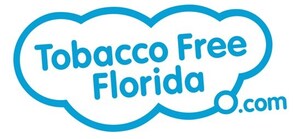TOBACCO FREE FLORIDA MARKS 15 YEARS OF SUCCESS AS FLORIDA'S TOBACCO EDUCATION, CESSATION AND USE PREVENTION PROGRAM
Funded by money derived from the state's tobacco settlement agreement, the Bureau of Tobacco Free Florida launched in 2007 in response to overwhelming approval by Florida voters.
TALLAHASSEE, Fla., April 18, 2022 /PRNewswire/ -- In commemoration of 15 years since the Tobacco Free Florida's creation by Florida's voters, the award-winning tobacco cessation, prevention and education program is reflecting on a decade and a half of success and refocusing today to face the public health challenges of tomorrow. In this anniversary year, Tobacco Free Florida has updated and improved its tobacco cessation offerings for adults and launched a quit program for teens who are addicted to e-cigarettes that also engages their parents for support.
Tobacco Free Florida provides cessation services as well as funding a behavior change media campaign that reaches all 67 counties in Florida. A part of Florida's Department of Health, the program partners with community organizations to reach a variety of audiences, age ranges and community segments in addition to its statewide educational and empowerment initiatives.
An independently evaluated public health program, Tobacco Free Florida has been highly successful, lowering the state's smoking rates, saving lives and saving Florida billions of dollars in public health costs. The positive results come despite Tobacco Free Florida continuing to be funded at less than 40% of the level recommended in the Centers for Disease Control and Prevention's Best Practices for Comprehensive Tobacco Control Programs.1
"Since the late 1990s following the tobacco industry settlement, the state of Florida has been recognized as a worldwide leader and model program because we have been effective in addressing the tremendous public health harms of tobacco use on our society," said Laura Corbin, Bureau Chief for Tobacco Free Florida. "Through innovative and effective campaigns and programs and we have continued to evolve to meet new challenges as the tobacco industry has adapted."
Into its 15th year and beyond, Tobacco Free Florida efforts will remain dedicated to:
- Finding new ways to reach our audiences
- Being laser-focused on preventing youth from using tobacco and nicotine products
- Offering high-quality, free programs to help people quit
- Providing cessation and education information through new media channels
- Staying diligent on new products, such as e-cigarettes, that are enticing youth
- Adapting offerings to meet the community's needs.
Successes over Tobacco Free Florida's 15 years include:
- Reducing Florida's adult smoking rates since 2007 has resulted in well over $17.7 billion in savings in smoking-related health care costs across the state.2
- Since Tobacco Free Florida's hard-hitting advertising launched, the number of quit attempts across the state have increased into the millions, and the campaign has been linked to reducing relapses among those who quit.3
- Youth cigarette use in Florida declined from 10.6% in 2006 to 1.1% in 2021.4,5
- Tobacco Free Florida's free cessation services alone have helped more than 254,000 Floridians quit for good.
- There are fewer adult smokers in Florida total today than when Tobacco Free Florida launched, despite Florida's population growing by more than 3 million people during that time.6
Adapting for the next 15 years and beyond, Tobacco Free Florida continues to work with new channels and find innovative approaches to advance the importance of living tobacco free. The Quit Your Way program offers different methods and services a person can use to start their quitting journey, such as phone quit, group quit, and web quit.
Phone Quit provides access to a trained professional Quit Coach. Group Quit and Virtual Group Quit sessions are led by a trained local specialist, providing support and guidance to help you quit smoking. These classes are available in all 67 counties and are often available in both English and Spanish. A Quit Coach is available 24/7, and can provide up to three free personalized coaching sessions, and can help create a custom quit plan based on person's needs.Web Quit helps create a personalized web-based quit plan that anyone can follow at their own pace and in private.
In 2022, Tobacco Free Florida launched a new e-cigarette cessation service for teens called Live Vape Free. The text-based program helps teens ages 13 to 17-years-old quit e-cigarettes and provides adults with the tools they need to support teens on their quit journey. To learn more, visit TobaccoFreeFlorida.com/LiveVapeFree.
The Tobacco Free Florida toll-free number, 1-877-U-CAN-NOW (877-822-6669), is also available 24 hours a day, 7 days a week, and designed to help people looking for information on how to quit.
For additional resources, please visit TobaccoFreeFlorida.com/QuitYourWay.
About Tobacco Free Florida
The Florida Department of Health's Tobacco Free Florida campaign is a statewide cessation and prevention campaign funded by Florida's tobacco settlement fund. Since the program began in 2007, more than 254,000 Floridians have successfully quit using one of Tobacco Free Florida's free tools and services. There are now approximately 451,000 fewer adult smokers in Florida than there was 10 years ago, and the state has saved $17.7 billion in health care costs.i To learn more about Tobacco Free Florida's Quit Your Way services, visit www.TobaccoFreeFlorida.com or follow the campaign on Facebook at www.facebook.com/TobaccoFreeFlorida or on Twitter at www.twitter.com/tobaccofreefla.
___________________________
1 Centers for Disease Control and Prevention. Best Practices for Comprehensive Tobacco Control Programs — 2014.Atlanta: U.S. Department of Health and Human Services, Centers for Disease Control and Prevention, National Center for Chronic Disease Prevention and Health Promotion, Office on Smoking and Health, 2014.
2 Mann, Nathan M, Nonnemaker, James M., Thompson, Jesse. "Smoking-Attributable Health Care Costs in Florida and Potential Health Care Cost Savings Associated with Reductions in Adult Smoking Prevalence." 2016.
3 Centers for Disease Control and Prevention. Best Practices for Comprehensive Tobacco Control Programs—2014. Atlanta: U.S. Department of Health and Human Services, Centers for Disease Control and Prevention, National Center for Chronic Disease Prevention and Health Promotion, Office on Smoking and Health, 2014.
4 Centers for Disease Control and Prevention (CDC). Behavioral Risk Factor Surveillance System Survey Data. Atlanta, Georgia: U.S. Department of Health and Human Services, Centers for Disease Control and Prevention, 2006.
5 Centers for Disease Control and Prevention (CDC). Behavioral Risk Factor Surveillance System Survey Data. Atlanta, Georgia: U.S. Department of Health and Human Services, Centers for Disease Control and Prevention, 2021.
6 Centers for Disease Control and Prevention (CDC). Behavioral Risk Factor Surveillance System Survey Data. Atlanta, Georgia: U.S. Department of Health and Human Services, Centers for Disease Control and Prevention, 2021.
SOURCE Tobacco Free Florida

WANT YOUR COMPANY'S NEWS FEATURED ON PRNEWSWIRE.COM?
Newsrooms &
Influencers
Digital Media
Outlets
Journalists
Opted In




Share this article